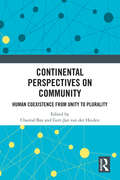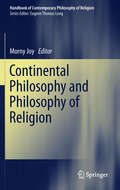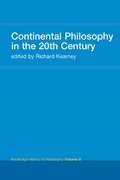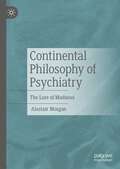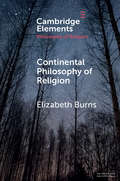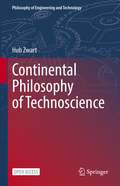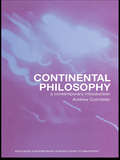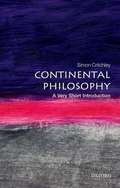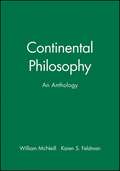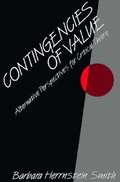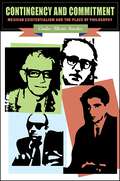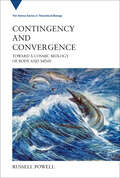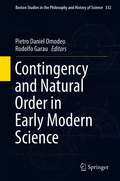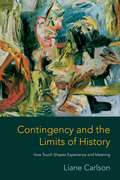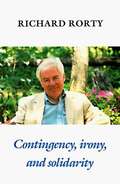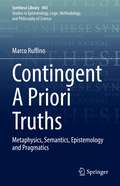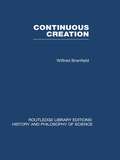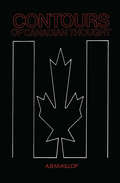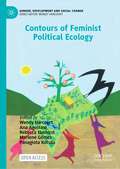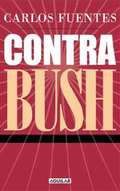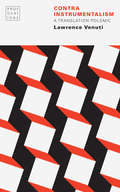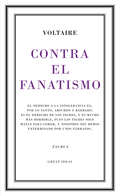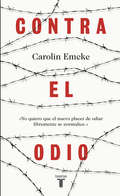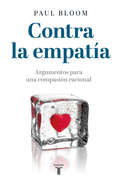- Table View
- List View
Continental Perspectives on Community: Human Coexistence from Unity to Plurality
by Chantal Bax Gert-Jan van der HeidenThis volume explores the issues at the center of many historical and contemporary reflections on community and sociality in Continental philosophy. The essays reflect on the thought of Nietzsche, Heidegger, Levinas, Arendt, Derrida, Badiou, Fanon, Baldwin, Nancy, Agamben and Laruelle. Continental Perspectives on Community brings the different approaches of these thinkers into conversation with each other. It discusses the possibility of how the concept of community can extend beyond the one and beyond any sense of unity and totality. Additionally, the book shows how notion of community in plurality is at the heart of ethical and political reflections on alterity and race, of political philosophical reflections on the exception, and of ontological reflections on what it means for humans to be social. In this way, it offers an important contribution to the examination of how a community can be thought today. This book will be of interest to scholars and advanced students working on social, political, and cultural issues in Continental philosophy.
Continental Philosophy and Philosophy of Religion (Handbook of Contemporary Philosophy of Religion #4)
by Morny JoyThis is the first book that provides access to twelve Continental philosophers and the consequences of their thinking for the philosophy of religion. Basically, in the second half of the twentieth century, it has been treated from within the Anglo- American school of philosophy, which deals mainly with proofs and truths, and questions of faith. This approach is more concerned with human experience, and pays more attention to historical context and cultural influences. As such, it provides challenging questions about the way forward for philosophy of religion in the twenty-first century.
Continental Philosophy in the 20th Century: Routledge History of Philosophy Volume 8 (Routledge History Of Philosophy Ser. #Vol. 8)
by Richard KearneyContinental philosophy is one of the twentieth century's most important and challenging philosophical movements. This major volume includes fourteen chapters on its major representatives and schools, including phenomenology, existentialism and postmodernism.
Continental Philosophy of Psychiatry: The Lure of Madness
by Alastair MorganThis book explores how the continental philosophical tradition in the 20th century attempted to understand madness as madness. It traces the paradoxical endeavour of reason attempting to understand madness without dissolving the inherent strangeness and otherness of madness. It provides a comprehensive overview of the contributions of phenomenology, critical theory, psychoanalysis, post-structuralism and anti-psychiatry to continental philosophy and psychiatry. The book outlines an intellectual tradition of psychiatry that is both fascinated by and withdraws from madness. Madness is a lure for philosophy in two senses; as both trap and provocation. It is a trap because this philosophical tradition constructs an otherness of madness so profound, that it condemns madness to silence. However, the idea of madness as another world is also a fertile provocation because it respects the non-identity of madness to reason. The book concludes with some critical reflections on the role of madness in contemporary philosophical thought.
Continental Philosophy of Religion (Elements in the Philosophy of Religion)
by Elizabeth BurnsThis Element presents key features from the writings on religion of twelve philosophers working in or influenced by the continental tradition (Hegel, Kierkegaard, Nietzsche, Heidegger, Rosenzweig, Tillich, Derrida, Caputo, Levinas, Hadot, Jantzen, and Anderson). It argues for a hybrid methodology which enables transformational religious responses to the problems associated with human existence (the existential problems of meaning, suffering, and death) to be supported both by reasoned argument and by revelation, narrative philosophy, and experiential verification.
Continental Philosophy of Technoscience (Philosophy of Engineering and Technology #38)
by Hub ZwartThe key objective of this volume is to allow philosophy students and early-stage researchers to become practicing philosophers in technoscientific settings. Zwart focuses on the methodological issue of how to practice continental philosophy of technoscience today. This text draws upon continental authors such as Hegel, Engels, Heidegger, Bachelard and Lacan (and their fields of dialectics, phenomenology and psychoanalysis) in developing a coherent message around the technicity of science or rather, “technoscience”. Within technoscience, the focus will be on recent developments in life sciences research, such as genomics, post-genomics, synthetic biology and global ecology. This book uniquely presents continental perspectives that tend to be underrepresented in mainstream philosophy of science, yet entail crucial insights for coming to terms with technoscience as it is evolving on a global scale today.This is an open access book.
Continental Philosophy: A Contemporary Introduction (Routledge Contemporary Introductions to Philosophy)
by Andrew CutrofelloContinental Philosophy: A Contemporary Introduction is ideal for students coming to the topic for the first time. It introduces the origins and development of the tradition, tracing it from Kant to the present day. Taking a clear thematic approach, Andrew Cutrofello introduces and assesses continental philosophy’s relation to fundamental questions in philosophy, such as ethics, humanism, phenomenology, politics and metaphysics, centring the book around the following questions: What is knowledge? What is moral obligation? For what should we hope? What is ‘man’? What is critique? Andrew Cutrofello’s style is lively and engaging. He also introduces the major as well as the lesser-known thinkers of the continental tradition: from Kant, Mill and Nietzsche and Husserl to Heidegger, Merleau-Ponty, Sartre Levinas, Bataille and Kristeva.
Continental Philosophy: A Very Short Introduction
by Simon CritchleyIn this enlightening new Very Short Introduction, Simon Critchley shows us that Continental philosophy encompasses a distinct set of philosophical traditions and practices, with a compelling range of problems all too often ignored by the analytic tradition. He discusses the ideas and approaches of philosophers such as Kant, Hegel, Nietzsche, Husserl, Heidegger, Sartre, Habermas, Foucault, and Derrida. He also introduces key concepts such as existentialism, nihilism, and phenomenology, by explaining their place in the Continental tradition. The perfect guide for anyone interested in the great philosophers, this volume explains in lucid, straightforward language the split between Continental and Anglo-American philosophy and the importance of acknowledging Continental philosophy.
Continental Philosophy: An Anthology
by William H. Mcneill Karen S. FeldmanFrom Immanuel Kant to Postmodernism, this volume provides an unparalleled student resource: a wide-ranging collection of the essential works of more than 50 seminal thinkers in modern European philosophy. Areas covered include Kant and German Idealism, Existentialism, Phenomenology, Hermeneutics, Marxism and the Frankfurt School, Structuralism, Psychoanalysis, Feminism, Deconstruction, and Postmodernism. Each section begins with a concise and helpful introduction, and all the texts have been selected for accessibility as well as significance, making the volume ideal for introductory and advanced levels in philosophy, cultural studies, literary theory, and the history of modern thought.
Contingencies of Value: Alternative Perspectives for Critical Theory
by Barbara Herrnstein SmithPolemical without being rancorous, Contingencies of Value mounts a powerful critique of traditional conceptions of value, taste, judgment, and justification. Through incisive discussions of works by, among others, David Hume, Immanuel Kant, Northrop Frye, Georges Bataille, Jacques Derrida, Richard Rorty, and Jürgen Habermas, Smith develops an illuminating alternative framework for the explanation of these topics. All value, she argues, is radically contingent. Neither an objective property of things nor merely a subjective response to them, it is the variable effect of numerous interacting economies that is, systems of apportionment and circulation of "goods." Aesthetic value, moral value, and the truth-value of judgments are no exceptions, though traditional critical theory, ethics, and philosophy of language have always tried to prove otherwise. Smith deals in an original way with a wide variety of contemporary issues--from the relation between popular and high culture to the conflicting conception of human motives and actions in economic theory and classical humanism. In an important final chapter, she addresses directly the crucial problem of relativism and explains why a denial of the objectivity of value does not--as commonly feared and charged--produce either a fatuous egalitarianism or moral and political paralysis.
Contingency and Commitment: Mexican Existentialism and the Place of Philosophy (SUNY series in Latin American and Iberian Thought and Culture)
by Carlos Alberto SánchezThis book examines the emergence of existentialism in Mexico in the 1940s and the quest for a genuine Mexican philosophy that followed it. It focuses on the pivotal moments and key figures of the Hyperion group, including Emilio Uranga, Luis Villoro, Leopoldo Zea, and Jorge Portilla, who explored questions of interpretation, marginality, identity, and the role of philosophy. Carlos Alberto Sánchez was the first to introduce and emphasize the philosophical significance of the Hyperion group to readers of English in The Suspension of Seriousness, and in the present volume he examines its legacy and relevancy for the twenty-first century. Sánchez argues that there are lessons to be learned from Hyperion's project not only for Latino/a life in the United States but also for the lives of those on the fringes of contemporary, postmodern or postcolonial, economic, political, and cultural power.
Contingency and Convergence: Toward a Cosmic Biology of Body and Mind (Vienna Series in Theoretical Biology #25)
by Russell PowellCan we can use the patterns and processes of convergent evolution to make inferences about universal laws of life, on Earth and elsewhere?In this book, Russell Powell investigates whether we can use the patterns and processes of convergent evolution to make inferences about universal laws of life, on Earth and elsewhere. Weaving together disparate philosophical and empirical threads, Powell offers the first detailed analysis of the interplay between contingency and convergence in macroevolution, as it relates to both complex life in general and cognitively complex life in particular. If the evolution of mind is not a historical accident, the product of convergence rather than contingency, then, Powell asks, is mind likely to be an evolutionarily important feature of any living world? Stephen Jay Gould argued for the primacy of contingency in evolution. Gould's “radical contingency thesis” (RCT) has been challenged, but critics have largely failed to engage with its core claims and theoretical commitments. Powell fills this gap. He first examines convergent regularities at both temporal and phylogenetic depths, finding evidence that both vindicates and rebuffs Gould's argument for contingency. Powell follows this partial defense of the RCT with a substantive critique. Among the evolutionary outcomes that might defy the RCT, he argues, cognition is particularly important—not only for human-specific issues of the evolution of intelligence and consciousness but also for the large-scale ecological organization of macroscopic living worlds. Turning his attention to complex cognitive life, Powell considers what patterns of cognitive convergence tell us about the nature of mind, its evolution, and its place in the universe. If complex bodies are common in the universe, might complex minds be common as well?
Contingency and Natural Order in Early Modern Science (Boston Studies in the Philosophy and History of Science #332)
by Pietro Daniel Omodeo Rodolfo GarauThis volume considers contingency as a historical category resulting from the combination of various intellectual elements – epistemological, philosophical, material, as well as theological and, broadly speaking, intellectual. With contributions ranging from fields as diverse as the histories of physics, astronomy, astrology, medicine, mechanics, physiology, and natural philosophy, it explores the transformation of the notion of contingency across the late-medieval, Renaissance, and the early modern period. Underpinned by a necessitated vision of nature, seventeenth century mechanism widely identified apparent natural irregularities with the epistemological limits of a certain explanatory framework. However, this picture was preceded by, and in fact emerged from, a widespread characterization of contingency as an ontological trait of nature, typical of late-Scholastic and Renaissance science. On these bases, this volume shows how epistemological categories, which are preconditions of knowledge as “historically-situated a priori” and, seemingly, self-evident, are ultimately rooted in time. Contingency is intrinsic to scientific practice. Whether observing the behaviour of a photon, diagnosing a patient, or calculating the orbit of a distant planet, scientists face the unavoidable challenge of dealing with data that differ from their models and expectations. However, epistemological categories are not fixed in time. Indeed, there is something fundamentally different in the way an Aristotelian natural philosopher defined a wonder or a “monstrous” birth as “contingent”, a modern scientist defines the unexpected result of an experiment, and a quantum physicist the behavior of a photon. Although to each inquirer these instances appeared self-evidently contingent, each also employs the concept differently.
Contingency and the Limits of History: How Touch Shapes Experience and Meaning
by Liane CarlsonCentral to the historicizing work of recent decades has been the concept of contingency, the realm of chance, change, and the unnecessary. Following Nietzsche and Foucault, genealogists have deployed contingency to show that all institutions and ideas could have been otherwise as a critique of the status quo. Yet scholars have spent very little time considering the genealogy of contingency itself—or what its history means for its role in politics.In Contingency and the Limits of History, Liane Carlson historicizes contingency by tying it to its theological and etymological roots in “touch,” contending that much of its critical, disruptive power is specific to our current historical moment. She returns to an older definition of contingency found in Christian theology that understands it as the lot of mortal creatures, who suffer, feel, bleed, and change, in contrast to a necessary, unchanging, impassible God. Far from dying out, Carlson reveals, this theological past persists in continental philosophy, where thinkers such as Novalis, Schelling, Merleau-Ponty, and Serres have imagined contingency as a type of radical destabilization brought about by the body’s collision with a changing world. Through studies of sickness, loneliness, violation, and love, she shows that different experiences of contingency can lead to dramatically dissimilar ethical and political projects. A strikingly original reconsideration of one of continental philosophy and critical theory’s most cherished concepts, this book reveals the limits of historicist accounts.
Contingency, Irony, and Solidarity
by Richard Mckay RortyIn this 1989 book Rorty argues that thinkers such as Nietzsche, Freud, and Wittgenstein have enabled societies to see themselves as historical contingencies, rather than as expressions of underlying, ahistorical human nature or as realizations of suprahistorical goals. This ironic perspective on the human condition is valuable on a private level, although it cannot advance the social or political goals of liberalism. In fact Rorty believes that it is literature not philosophy that can do this, by promoting a genuine sense of human solidarity. A truly liberal culture, acutely aware of its own historical contingency, would fuse the private, individual freedom of the ironic, philosophical perspective with the public project of human solidarity as it is engendered through the insights and sensibilities of great writers. The book has a characteristically wide range of reference from philosophy through social theory to literary criticism. It confirms Rorty's status as a uniquely subtle theorist, whose writing will prove absorbing to academic and nonacademic readers alike.
Contingency, irony, and solidarity
by Richard RortyIn this book, major American philosopher Richard Rorty argues that thinkers such as Nietzsche, Freud, and Wittgenstein have enabled societies to see themselves as historical contingencies, rather than as expressions of underlying, ahistorical human nature, or as realizations of suprahistorical goals. This ironic perspective on the human condition is valuable but it cannot advance Liberalism's social and political goals. In fact, Rorty believes that it is literature and not philosophy that can do this, by promoting a genuine sense of human solidarity. Specifically, it is novelists such as Orwell and Nabokov who succeed in awakening us to the cruelty of particular social practices and individual attitudes. Thus, a truly liberal culture would fuse the private, individual freedom of the ironic, philosophical perspective with the public project of human solidarity as it is engendered through the insights and sensibilities of great writers. Rorty uses a wide range of references--from philosophy to social theory to literary criticism--to elucidate his beliefs.
Contingent A Priori Truths: Metaphysics, Semantics, Epistemology and Pragmatics (Synthese Library #443)
by Marco RuffinoThis monograph offers a comprehensive study of contingent a priori truths. Building onto a theoretical framework developed by the philosopher and logician Saul Kripke, the author also presents a new approach to these truths. The first part of the book details the many theories on contingent a priori truths. The coverage examines the cases of Kripke and David Kaplan, Donnellan and the de re requirement, Evans and weak contingency, as well as Plantinga, Salmon, Soames, and the pseudo a priori. Overall, it provides a systematic discussion and critical review of all these many positions. Next, the author develops an alternative approach. His working hypothesis is that performative verbs must play a central role in Kripke’s examples, even if they do not show up at the surface structure of the corresponding sentences. This opens up an entirely new way of looking at Kripke’s cases and of treating them by exploring some aspects of the theory of illocutionary acts. His discussion also examines brute facts and institutional facts, indexicals and performatives, as well as Frege’s theory of definitions. Providing an authoritative exploration into contingent a priori truths, this book will be of interest to students, academics, and researchers in philosophy and logic.
Continuous Creation: A Biological Concept of the Nature of Matter (Routledge Library Editions: History & Philosophy of Science)
by Wilfred BranfieldOriginally published in 1950, this book challenged the basis of our beliefs about the relation of life to matter. Already aware that chalk, limestone and coal seams are the residues of ancient life, the author suggests that this knowledge may also be applied to the rest of matter. In that case, he argues, the origin of the world was not cosmic upheaval which broke down at last into life, but organic life itself.
Contours of Canadian Thought
by A. B. MckillopThe leaps of knowledge in nineteenth-century science shook the foundations of religious and humanistic values throughout much of the world. The Darwinian Revolution and similar developments presented enormous philosophical challenges to Canadian scientists, philosophers, and men of letters. Their responses, many and varied, form a central theme in this collection of essays by one of Canada's leading intellectual historians.McKillop explores the thought of a number of English-Canadian thinkers from the 1860s to the 1920s, decades that saw Canada's entry into the modern age. We meet Daniel Wilson, an educator and ethnologist for whom the pursuit of science was a form of poetic engagement, requiring the poet's sensibilities; John Watson, one of the world's leading exponents of objective idealism, whose philosophical premises helped to undermine the very religious tradition he sought to bolster; and William Dawson LeSueur, an apostle of Positivism, whose spirited defence of critical inquiry and evolutionary social ethics led him towards an entirely contradictory position.In addition to profiles of individuals, McKillop considers the ways in which their ideas operated in the context of Canadian institutions including the universities and the press. From these prospectives emerges a detailed analysis of the life of the mind of English Canada in an age of questioning, of doubt, and of struggle to reorient the intellectual and philosophical positions of a quickly changing society.
Contours of Feminist Political Ecology (Gender, Development and Social Change)
by Wendy Harcourt Rebecca Elmhirst Panagiota Kotsila Ana Agostino Marlene GómezThis open access book sets out the contours of feminist political ecology (FPE) as a major contribution to ongoing debates in the field. As Professor Lyla Mehta says in her Foreword, the book is "foregrounding multiple ways of knowing and being, thus enabling new conceptions of politics, justice and alternatives to dominant, capitalist development trajectories". In an innovative methodological twist, the edited book engages the reader in conversations that have emerged from the multi-sited and cross-generational dialogues of the Well-Being Ecology Gender cOmmunities (WEGO) network over the last four years. The conversations explore topics that range from climate change and extractivism, to body politics and health, degrowth, care and community well-being. The authors reflect on their collective learning process as they map out the new directions of FPE research and analysis. The chapters highlight WEGO transnational/transdisciplinary conversations with local communities, social movements and different academic spaces. The book foregrounds the ethics of doing feminist work inside and outside academe and brings to life the importance of doing reflexive research aware of situated historical and contemporary geographical contours of power.
Contra Bush
by Carlos Fuentes"La insolencia pierde a los hombres y a las naciones." Esta obra reúne reflexiones sobre la crisis política estadounidense y global provocada por la administración de George W. Bush y su círculo más próximo. En un planeta donde miles de millones de seres humanos reclaman por trabajo y salud, educación y techo, los Estados Unidos, única potencia mundial, imponen hoy intereses ajenos y opuestos a esas necesidades. Olvidando que todos somos descendientes de encuentros de civilizaciones, Bush y su equipo exaltan los fundamentalismos violentos en vez de promover, como incumbe al fuerte, políticas constructivas que eliminen los focos de tensión que atraen a insatisfechos y fanáticos. En Contra Bush, Carlos Fuentes formula un deseo que es a la vez convocatoria a los ciudadanos estadounidenses: que recuperen la voluntad de emplear la extraordinaria fuerza de su país para cooperar en favor de la legalidad internacional, el desarrollo económico y el respeto a las culturas. Sólo así el terrorismo podrá ser vencido.
Contra Instrumentalism: A Translation Polemic (Provocations)
by Lawrence VenutiContra Instrumentalism questions the long-accepted notion that translation reproduces or transfers an invariant contained in or caused by the source text. This “instrumental” model of translation has dominated translation theory and commentary for more than two millennia, and its influence can be seen today in elite and popular cultures, in academic institutions and in publishing, in scholarly monographs and in literary journalism, in the most rarefied theoretical discourses and in the most commonly used clichés.Contra Instrumentalism aims to end the dominance of instrumentalism by showing how it grossly oversimplifies translation practice and fosters an illusion of immediate access to source texts. Lawrence Venuti asserts that all translation is an interpretive act that necessarily entails ethical responsibilities and political commitments. Venuti argues that a hermeneutic model offers a more comprehensive and incisive understanding of translation that enables an appreciation of not only the creative and scholarly aspects of what a translator does but also the crucial role translation plays in the cultural and social institutions that shape human life.
Contra el fanatismo religioso (Serie Great Ideas #39)
by Voltaire40 grandes ideas que han cambiado el mundo. Este libro condensa los argumentos clave contra la intolerancia que Voltaire elaboró en su Tratado sobre la tolerancia con motivo del caso Calas. Las razones y conclusiones de Voltaire eran tan válidas entonces como lo son hoy, y la pertinencia de este texto resulta inquietante. A lo largo de la historia, algunos libros han cambiado el mundo. Han transformado la manera en que nos vemos a nosotros mismos y a los demás. Han inspirado el debate, la discordia, la guerra y la revolución. Han iluminado, indignado, provocado y consolado. Han enriquecido vidas, y también las han destruido. Taurus publica las obras de los grandes pensadores, pioneros, radicales y visionarios cuyas ideas sacudieron la civilización y nos impulsaron a ser quienes somos. La crítica ha dicho sobre la colección «Great Ideas»:«Taurus propone un doble envite con este lanzamiento. Por un ladoaumenta su compromiso con el ensayo; por otro, recupera el gusto por la estética. A los volúmenes se les ha proporcionado una portada delicada y cuidada (copian el original británico) que invita a la lectura.»La Razón
Contra el odio: Un alegato en defensa de la pluralidad de pensamiento, la tolerancia y la libertad
by Carolin EmckeEn este contundente y brillante ensayo, la intelectual Carolin Emcke reflexiona acerca de las grandes cuestiones de la actualidad: el fanatismo, el racismo y la creciente desconfianza, por no decir hostilidad, hacia la democracia. Un alegato en defensa de la pluralidad de pensamiento, la tolerancia y la libertad. «El odio solo se combate rechazando su invitación al contagio. Es necesario activar lo que escapa a quienes odian: la observación atenta, la diferenciación constante y el cuestionamiento de uno mismo.»Carolin Emcke Racismo, fanatismo, antidemocracia... en un espacio público cada vez más polarizado se impone un pensamiento que solo permite dudar de las opiniones ajenas, nunca de las propias. A este planteamiento dogmático, Carolin Emcke -premio de la Paz de los libreros alemanes y una de las intelectuales europeas más interesantes de su generación- contrapone un elogio comprometido de lo diverso, de lo «impuro». La respuesta a nuestros problemas actuales no puede quedar relegada sencillamente a los políticos, ya que todos somos responsables de luchar contra todas las formas cotidianas de desprecio y denigración. La democracia solo es posible si tenemos el valor de enfrentarnos al odio. «Emcke demuestra que el diálogo es posible, y su libro nos recuerda que es una tarea que debemos abordar.»Fragmento del fallo del jurado del Premio de la Paz de los libreros alemanes
Contra la empatía: Argumentos para una compasión racional
by Paul BloomEn un mundo dividido, la empatía no es la solución: es el problema. Es habitual que pensemos que nuestra capacidad de experimentar el sufrimiento de los otros es una especie de fuente de nuestra bondad; sin embargo, no hay nada más equivocado. Paul Bloom, maestro de la universidad de Yale, revela que la empatía es uno de los principales motores de la inequidad y la inmoralidad en la sociedad. Lejos de ayudarnos a mejorar nuestras relaciones, la empatía es una emoción caprichosa e irracional que apela a nuestros propios prejuicios e, irónicamente, nos lleva con frecuencia a la crueldad. Bloom, basando sus argumentos en investigaciones científicas, ejemplifica que algunas de las peores decisiones tomadas por individuos y naciones -a quién dar dinero, cómo responder al cambio climático, a quién meter en prisión- son impulsadas normalmente por honestas, aunque desviadas, emociones. Con precisión y sabiduría, Contra la empatía evidencia cómo ésta distorsiona todos los aspectos de nuestra vida, desde la filantropía y la caridad, hasta el sistema de justicia; desde la sanidad y la educación, hasta la paternidad y el matrimonio. Sin empatía, insiste Bloom, nuestras decisiones serían más claras, más justas y, sí, más morales. La crítica ha dicho.. #Levante la mano quién de ustedes está en contra de la empatía# ¿Nadie? Paul Bloom admite libremente que estar en contra de ella es lo que la mayoría de las personas debería elegir. El autor argumenta por qué un análisis racional, moral y compasivo son mejores elementos para hacer del mundo un lugar mejor [#]. Para aquellos que deseen entender mejor cómo el corazón y la cabeza batallan por la supremacía y cuál es el órgano que debería regirnos, este libro es un acercamiento contraintuitivo que, además de ser delicioso de leer, es informativo.# Adrian Liang, Amazon Book Review #Refrescante.# Library Journal #Provocador# y poderoso.# Publishers Weekly #Un intrigante contraataque hacia el moderno cinismo psicológico.# Kirkus #Bloom desafía una de nuestras suposiciones más asumidas de qué significa ser bueno. Con humor y elegancia, Bloom revela la debilidad y la falsedad de este supuesto, y nos da una nueva visión de moralidad basada en cómo nuestra mente trabaja.# Carl Zimmer, autor de Evolution: Making Sense of Life #El análisis de Bloom es penetrante, comprensivo y actual. Contra la empatía está destinado a convertirse en un clásico de la psicología.# Michael Shermer, editor de la revista Skeptic, columnista en Scientific American y autor de The Science of Good and Evil.
